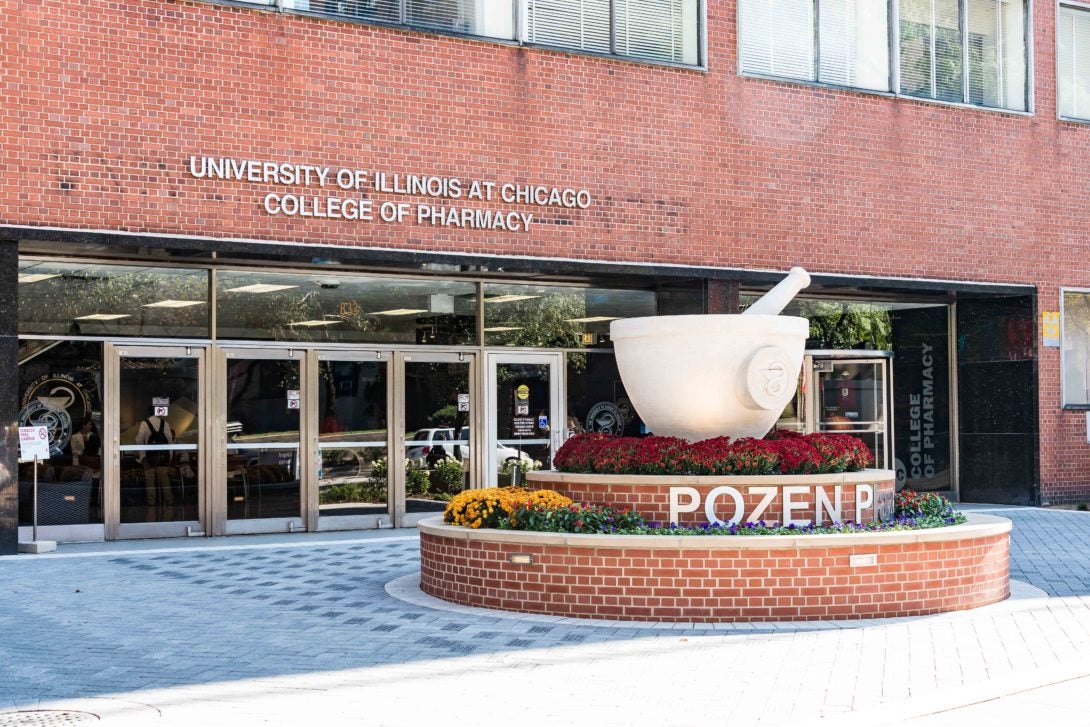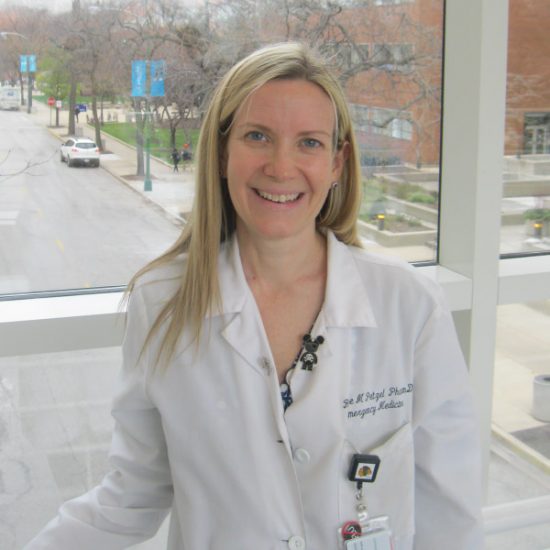Emergency Medicine
PGY1 pharmacy actions Heading link
Location Heading link

Pharmacy residency training programs are held within the College of Pharmacy at the University of Illinois Chicago (UIC) and the University
of Illinois Medical Center. The Department of Pharmacy Practice, the department of all residency trainees, is the most comprehensive unit of its
type in the United States and continues a tradition of exemplary service through its mission of providing quality education, research, and patient
care. The department educates and trains students, residents, and fellows as well as practicing pharmacists to become nationally recognized for
their leadership, knowledge and competence in practice, research, and teaching.
Program Information Heading link
The University of Illinois Hospital and the Department of Pharmacy Practice are pleased to offer a one-year PGY-2 residency in Emergency Medicine (EM). The goal of this program is to provide the resident the opportunity to develop expertise in the practice of emergency medicine pharmacy setting as an integrated member of the interdisciplinary EM team. This residency training program will foster and develop the necessary clinical and didactic teaching and research skills and experience such that upon completion of this residency the resident should be prepared to teach other health care professionals, students and trainees. The focus of training in this residency is in the Emergency Department (ED) where residents are expected to develop the skills to be capable to care for patients with a variety of diseases and disorders and varying acuity levels. During this residency training program, there are multiple Emergency Department settings, as well as a variety of elective training sites to meet the individual clinical training needs of the resident. The faculty serves as one of the largest clinical groups in the medical center and provides a wealth of knowledge and experience. The program will provide ample opportunity to enhance leadership and communication skills. Graduates of this program will be skilled clinical practitioners with experience in didactic and clinical teaching as well as clinical research.
The Department of Pharmacy Practice has long standing history of pharmacy practice, collaborative research, and post-doctoral training with the Department of Emergency Services. Clinical pharmacy services were implemented in the Emergency Department in 1979. The Department of Pharmacy Practice collaborated with the Department of Emergency Services to create the in-house clinical pharmacy on-call program, which is still in existence today. In the 1990’s the two departments, in collaboration with the Toxikon consortium, offered the clinical toxicology fellowship, which provided clinical pharmacy training in the fields of toxicology and emergency medicine.
This residency site agrees that no person at this site will solicit, accept, or use any ranking-related information from any residency applicant.
Program
Program Purpose
PGY2 pharmacy residency programs build on Doctor of Pharmacy (Pharm.D.) education and PGY1 pharmacy residency programs to contribute to the development of clinical pharmacists in specialized areas of practice. PGY2 residencies provide residents with opportunities to function independently as practitioners by conceptualizing and integrating accumulated experience and knowledge and incorporating both into the provision of patient care or other advanced practice settings. Residents who successfully complete an accredited PGY2 pharmacy residency are prepared for advanced patient care, academic, or other specialized positions, along with board certification, if available.
Program Goals
Educational Goals and Objectvies for PGY2 EM Residents are outlined in the official American Society of Health-Systems Pharmacists document, Educational Outcomes, Goals, and Objectives for Postgraduate Year Two (PGY2) Pharmacy Residents in Emergency Medicine.
Program Structure
The resident will complete clinical rotations in Emergency Medicine and Critical Care. Unless otherwise discussed and agreed upon by the resident, preceptor, and residency director, all clinical rotation learning experiences are one month in duration. The sequence of the clinical rotation learning experiences is individualized to meet the educational and clinical skill needs of each resident.
General
Other Required Learning Experiences:
- Emergency Medicine Administration (Longitudinal)
- Emergency Medicine Teaching (Longitudinal)
- Emergency Medicine On-Call/Noon Report/Staffing (Longitudinal)
- Emergency Medicine Research (Longitudinal)
Teaching Responsibilities
The resident will have an academic appointment at the University of Illinois Chicago College of Pharmacy for one year, to begin at the start of that year. The resident will be responsible for co-precepting students and PGY-1 pharmacy practice residents. The resident will also serve as a didactic lecturer in the Clinical Toxicology elective course for pharmacy students. The resident will also participate in the weekly Critical Care Conference. The resident will participate in either the Resident Teaching Certificate Program, or the Advanced Teaching and Learning Program offered to PGY2 residents and fellows. Completion of additional teaching activities throughout the course of the residency year are encouraged, but additional activities beyond those required should be approved by the RPD and should not hinder the other required residency activities.
Scholarly Activity
The resident will be expected to participate in clinical research and to complete 2 publications/posters within the year, including one major residency project. The resident will also be required to present one continuing education seminar during the residency year.
Seminar
The Emergency Medicine resident is required to prepare and deliver a 1-hour ACPE accredited seminar during the second half of the year.
On-Call Participation
The Emergency Medicine resident will participate in the clinical pharmacy resident on-call program.
Weekend Staffing Participation
The resident is expected to participate in weekend critical care staffing, every third weekend, starting in September through the end of the residency year.
Additional Benefits
Support for travel to ASHP’s Midyear Clinical Meeting will be provided. Travel expenses for additional meetings may also be covered. The resident will be given sick time and two weeks’ vacation and will be eligible for medical, dental, vision and life insurance.
Requirements
Applicants for the Emergency Medicine Residency should possess a PharmD degree. Completion of a PGY-1 post-doctoral residency is required. It is required that all PGY2 Emergency Medicine residents are eligible for licensure in Illinois and that the resident successfully obtains an Illinois Pharmacist license
Training Site & Facility
Required Clinical Rotation Learning Experiences (4 Weeks) include:
- Orientation
- Emergency Medicine, General
- Emergency Medicine, Advanced
- Emergency Medicine, Advanced II
- Emergency Medicine, Advanced III
- Emergency Medicine, Pediatrics
- Critical Care – Medical Intensive Care Unit
- Clinical Toxicology
Elective Clinical Rotation Learning Experiences (4 Weeks) include:
Choose 4 of the following:
- Emergency Medicine and Research
- Emergency Medicine Mobile Harm Reduction & Inpatient MOUD
- Emergency Medicine, Off-site ED
- Emergency Medicine, Off-site ED/trauma
- Pediatrics – Pediatric Intensive Care
- Critical Care – Cardiology Intensive Care
- Critical Care – Neurosurgery Intensive Care
The Health Sciences System
The University of Illinois Hospital and Health Sciences System is a 450 bed academic institution located approximately 2 miles west of downtown Chicago. The hospital serves an urban, indigent patient population.
The Emergency Department
The Emergency Department at the University of Illinois Hospital is a 31 bed department with an average of 50,000 patient visits annually. The ED treats both pediatric and adult patients. The ED staff is composed of attending physicians, clinical pharmacists, medical and pharmacy residents, nurses, nurse practitioners, social workers, and medical, pharmacy and nursing students.
Toxikon Consortium
The Toxikon Consortium is a collaborative group of toxicologists from the University of Illinois Hospital, Stroger Hospital (Cook County Hospital) and North Shore University Medical Center that serve as medical back-up for the Illinois Poison Control Center. A Toxicology fellowship is currently offered through the Toxikon Consortium for physicians.
Preceptors
Renee Petzel Gimbar, PharmD, FAACT
Clinical Associate Professor
Clinical Pharmacist, Emergency Medicine and Medical Toxicology
Director, PGY2 Emergency Medicine Residency
Scott T. Benken, PharmD, BCPS (AQ-Cardiology)
Clinical Associate Professor
Clinical Pharmacist, Medical ICU
Robert J. DiDomenico, PharmD, BCPS (AQ-Cardiology), FCCP, FHFSA, FACC
Associate Professor
Clinical Pharmacist, Cardiology and Cardiothoracic Surgery
Stephanie Dwyer Kaluzna, PharmD, BCCP
Clinical Assistant Professor
Clinical Pharmacist, Cardiology and Cardiothoracic Surgery
Director, PGY2 Cardiology Residency
Keri Kim, PharmD, MS CTS, BCPS
Clinical Assistant Professor
Clinical Pharmacist, Neurosciences
Jeffrey J. Mucksavage, PharmD, BCPS – Team Leader
Clinical Assistant Professor
Clinical Pharmacist, Neurosciences
Frank Paloucek, PharmD, FASHP, FAACT, DABAT
Clinical Professor
Clinical Pharmacist, Toxicology
Joanne Routsolias, RN, PharmD, BCPS
Clinical Pharmacist, Emergency Medicine and Medical Toxicology
John H. Stroger Hospital of Cook County
Eljim P. Tesoro, PharmD, BCPS, BCCCP
Clinical Associate Professor
Clinical Pharmacist, Neurosciences
Director, PGY2 Critical Care Pharmacy Residency
Current
2023 – 2024 Mary Margaret Maddox
Past Residents in Emergency Medicine
Since 1969, over 300 pharmacists successfully trained in our ASHP-accredited first-year post-graduate residency program. In addition, we have graduated over 100 individuals in our various specialized pharmacy residencies that encompass a wide range of fields that are second to none. Our diverse faculty, in combination with the numerous progressive practice sites, provides our residents with an experience like no other. Our residency alumnae hold prominent positions within pharmacy academia, industry, and professional organizations nationwide and are leaders in the world of pharmacy practice. We are proud of our tradition, our outcomes, and our graduates. With the increasing expectations of the public and other health professionals to improve the lives of patients, we are confident that our residency programs will grow and develop to meet this challenge.
Past Residents in Emergency Medicine
- 2022 – 2023 Tiffany Lin
- 2021 – 2022 Drew Posen
- 2020 – 2021 Hannah Kim
- 2019 – 2020 Ana Cruz
- 2018 – 2019 Devon Burhoe
- 2016 – 2017 Olivia Henderson
- 2015 – 2016 Kyle Gordon
- 2014 – 2015 Adam MacLasco
- 2013 – 2014 Christine Ciaramella
- 2012 – 2013 Tammy Nguyen
- 2010 – 2011 Laura Celmins
- 2008 – 2009 Krysta Zack Baack
- 2007 – 2008 Kristen Felice
- 1996 – 1997 Suzi Graf
- 1995 – 1996 Elizabeth Young
- 1993 – 1995 Brian Jahns
- 1992 – 1994 Kevin Rynn
Donald Tillman - 1992 – 1993 Pamela Tzallas Pontikes
- 1990 – 1992 Susan Gorman
Kimberly Linowiecki - 1985 – 1986 Janet Engle
- 1983 – 1984 Francine Delacruz
- 1981 – 1982 Joseph Barone
Michele Zell Kanter
